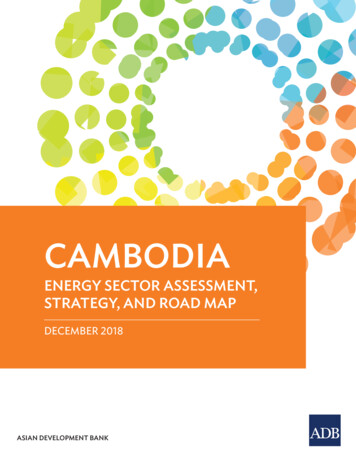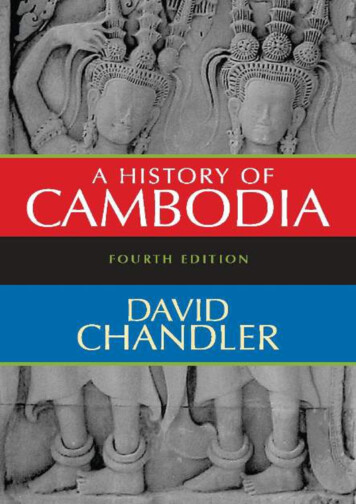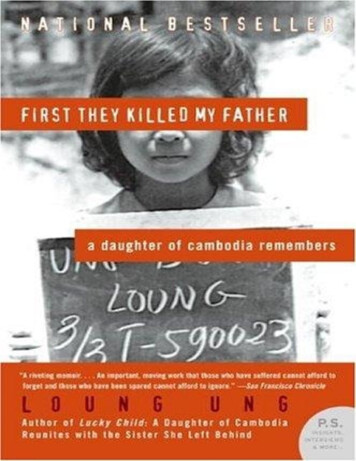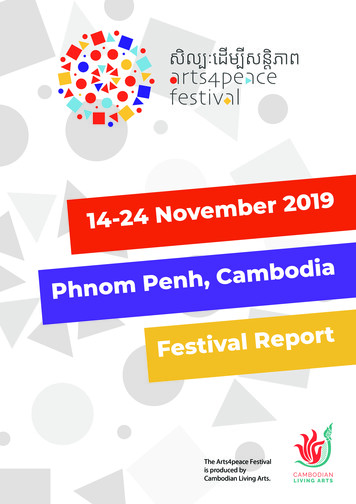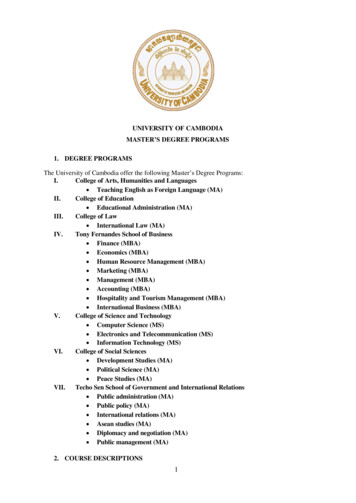
Transcription
UNIVERSITY OF CAMBODIAMASTER’S DEGREE PROGRAMS1. DEGREE PROGRAMSThe University of Cambodia offer the following Master’s Degree Programs:I.College of Arts, Humanities and Languages Teaching English as Foreign Language (MA)II.College of Education Educational Administration (MA)III.College of Law International Law (MA)IV.Tony Fernandes School of Business Finance (MBA) Economics (MBA) Human Resource Management (MBA) Marketing (MBA) Management (MBA) Accounting (MBA) Hospitality and Tourism Management (MBA) International Business (MBA)V.College of Science and Technology Computer Science (MS) Electronics and Telecommunication (MS) Information Technology (MS)VI.College of Social Sciences Development Studies (MA) Political Science (MA) Peace Studies (MA)VII.Techo Sen School of Government and International Relations Public administration (MA) Public policy (MA) International relations (MA) Asean studies (MA) Diplomacy and negotiation (MA) Public management (MA)2. COURSE DESCRIPTIONS1
I.COLLEGE OF ARTS, HUMANITIES AND LANGUAGESThe recent decades of war and internal conflict have only turned Cambodia into one of the poorestcountries in the world, despite an abundance of natural resources. And, in spite of improvements in thehuman resources sector since 1979, social indicators are still at a low level compared with neighboringcountries.There is thus the need to promote the development and maturation of the latent potential of Cambodia'shuman resources, through nurturing of the intellectual development of our people. This requires thecontinued development of an education system which can adapt and use the most appropriate modernpedagogical approaches in order to maximise returns on the investment (monetary and otherwise) madeby both the education system and students. In addition, as part of their armamentarium, administratorsneed to be competent in various other areas associated with the running and improvement of existingand anticipated educational services.We offer a Master's program in Teaching English as a Foreign Language. The aim of this program is toproduce teachers who can help Cambodians to enter into, and then compete on, the global marketplace,where English is increasingly important as a transnational language.DEGREE OFFERING1- TEACHING ENGLISH AS FOREIGN LANGUAGE (MA in TEFL)1. TEACHING ENGLISH AS FOREIGN LANGUAGEThis is designed for professionals with Bachelor’s degree in English and at least three years’ experiencein English Language Teaching (ELT). Applicants with a Bachelor’s degree in other fields who havetaught English for three years may be accepted, but will be required to take additional courses inEnglish.The course aims to provide a practical foundation in ELT methodology with a strong basis on thetheoretical concepts in Teaching English as a Foreign Language; and principles of education that willhelp enhance the participants’ knowledge of the English language and their teaching skills for a moremeaningful teaching career.All students are required to take and pass four common courses (12 credits) and a minimum of ten majorelective courses (30 credits). Thereafter, students may choose to do either:i. a research thesis (12 credits); orii. four other major elective courses (12 credits) followed by a Master’s Research Paper and aComprehensive Exam.2
CodeCourse TitleCreditsCommon Courses (12 credits)FDN501Research Methodology3FDN502Statistics for Research3FDN503Research Paper Writing3FDN504Ethical Leadership3Major Courses (18 Credits)EFL600Advanced Philosophy of Education3EFL610Introduction to Linguistics3EFL632Principles of Supervision3EFL633Educational Sociology3EFL634Educational Evaluation3EFL635Methodology in Language Teaching3Elective Courses (12 Credits)EFL636Legal and Ethical Issues in Education3EFL640Language and Culture3EFL642Curriculum Planning and Change3EFL645Information Technologies and Language Learning3Option I: Research Thesis (12 credits)RPT601-4Master’s Thesis12Option II: Comprehensive Exam (12 credits)EFL614Strategies in Teaching Grammar and Composition3EFL616Human Resource Management in Education3EFL647Comparative Linguistics3CAP601Capstone (Seminars, etc.)3EFL-MRPMaster’s Research Paper--EFL-CEXMaster’s Comprehensive Exam--3
II.COLLEGE OF EDUCATIONThe recent decades of war and internal conflict have only turned Cambodia into one of the poorestcountries in the world, despite an abundance of natural resources. And, in spite of improvements in thehuman resources sector since 1979, social indicators are still at a low level compared with neighboringcountries.There is thus the need to promote the development and maturation of the latent potential of Cambodia'shuman resources, through nurturing of the intellectual development of our people. This requires thecontinued development of an education system which can adapt and use the most appropriate modernpedagogical approaches in order to maximise returns on the investment (monetary and otherwise) madeby both the education system and students. In addition, as part of their armamentarium, administratorsneed to be competent in various other areas associated with the running and improvement of existingand anticipated educational services. Our graduate program in Educational Administration aim to fulfillthis basic, and urgent, need.DEGREE OFFERING1- EDUCATIONAL ADMINISTRATION (Med)1. EDUCATIONAL ADMINISTRATIONThis program is designed mainly for those with a Bachelor’s degree in Education. Applicants withdegrees in other fields and at least two years experience in teaching may be accepted into the programupon submission of certification of their teaching.The aim of the Master’s program in Educational Administration is to facilitate an individual’s transitionfrom an active classroom life to one where they play a greater role, as managers, in the organizationand development of teaching activities.All students are required to take and pass four common courses (12 credits) and a minimum of ten majorelective courses (30 credits). Thereafter, students may choose to do either:i.ii.a research thesis (12 credits); orfour other major elective courses (12 credits) followed by a Master’s Research Paper and aComprehensive Exam.4
CodeCourse TitleCreditsCommon Courses (12 credits)FDN501Research Methodology3FDN502Statistics for Research3FDN503Research Paper Writing3FDN504Ethical Leadership3Major Courses (18 Credits)EAD600Advanced Philosophy of Education3EAD611Financial Management in Education3EAD619Educational Management Information Systems3EAD632Principles of Educational Administration3EAD633Educational Sociology3EAD634Educational Evaluation3Elective Courses (12 Credits)EAD635Curriculum Planning and Change3EAD636Legal and Ethical Issues in Education3EAD641Educational Policy and Planning3EAD646Educational Change3Option I: Research Thesis (12 credits)RPT601Master’s Thesis12Option II: Comprehensive Exam (12 credits)EAD616Human Resource Management in Education3EAD617Organizational Behavior3EAD645Educational Facilities Planning & Management3CAP601Capstone (Seminars, etc.)3EAD-MRPMaster’s Research Paper--EAD-CEXMaster’s Comprehensive Exam--5
III-COLLEGE OF LAWAs Cambodia recovers from its traumatic past, and thereby modernizes and interacts more regionallyand globally, there is an ever-growing need for professionals with an in-depth knowledge of our owncountry's rules of law; Cambodian and international regulations governing trade and commerce betweencountries; international conventions on the environment, labor, intellectual property, human rights; andalso dispute resolution. Such knowledge is important for both policy development and advocacy workwithin Cambodia.The graduate programs of the College of Law are designed to meet the requirements of students whoalready have a Bachelor’s degree in Law but who need to have more in-depth, specialized knowledgeon various legal matters. Reflecting the University's various areas of focus in the Social Sciences (e.g.in International Relations, Peace Studies or Political Science), the present graduate programs in theCollege of Law deal with various aspects of international law.DEGREE OFFERING1- INTERNATIONAL LAW (LLM)Note: LLM – Master's Degree1. INTERNATIONAL LAWThe Program aims at familiarizing participants with the main schools of thought pertinent to theunderstanding of present international law and the many new concerns that have emerged ininternational society as it evolves towards more organized forms of cooperation. Among such newconcerns the Program will include the discussion of international legal developments characterizing thepresent-day international community, including the maintenance of international peace and security andspecialized areas such as the law of the sea, the law governing polar areas and internationalenvironmental law.The specific objectives of the course as follows: To provide systematic knowledge and information on the important legal doctrines andframeworks of the law and practice of public international law, international organizations, inparticular the United Nations, international criminal law, human rights and their mechanismsof implementation, international economic law, dispute settlement, global governance,international law and development, and the way that international law addresses such issues ashuman rights, environmental policy, terrorism, and war. To offer a theoretical appreciation of underlying ideas in the field of international law and thesettlement of disputes, this includes a critical orientation, discovering the challenges and6
potentials of international law and dispute settlement, including providing a multi-disciplinaryappreciation of the field of international law and the settlement of disputes. To provide a background that enables students to translate their skills to operate effectively ingovernments, non-governmental organizations, or international institutions. To respond to the demands and challenges faced by students, scholars, university professorsand practitioners who are continuing their education and mid-career professionals who areworking in national or international governmental or non-governmental organizations andprivate enterprises.All students are required to take and pass four common courses (12 credits) and a minimum of ten majorelective courses (30 credits). Thereafter, students may choose to do either:i.a research thesis (12 credits); orii.four other major elective courses (12 credits) followed by a Master’s Research Paper and aComprehensive Exam.CodeCourse TitleCreditsCommon Courses (12 credits)FDN501Research Methodology3FDN502Statistics for Research3FDN503Research Paper Writing3FDN504Ethical Leadership3Major Courses (18 Credits)LAW504Introduction to International Law3LAW508United Nations3LAW511International Trade Law3LAW513International Human Rights Law3LAW514International Law and the State3LAW515Law of Treaty3Elective Courses (12 Credits)LAW516Global Environmental Governance3LAW607Negotiation and Conflict Resolution3LAW621Law of the Sea3LAW684International Relations3Option I: Research Thesis (12 credits)RPT601-4Master’s Thesis12Option II: Comprehensive Exam (12 credits)LAW602Politics in Developing Areas3LAW617Sociology of Human Rights37
LAW627International Development Law and Policy3CAP601Capstone (Seminars, etc.)3ILA-MRPMaster’s Research Paper--ILA-CEXMaster’s Comprehensive Exam--8
IV-TONY FERNANDES SCHOOL OF BUSINESSThe Tony Fernandes School of Business (formerly the College of Public and BusinessAdministration) has a threefold mission:1. to attract, educate, and train high-quality individuals to become ethical leaders in the public andprivate sectors2. to do research so as to advance knowledge, by using strong conceptual foundations to identifyand solve management problems; and by focusing on national, regional, and global issuesrelevant to Cambodia's needs for future development and further stabilisation as anindependent, self-contained sovereign state in the global arena.3. to act as a focal point for developing the capacity of Cambodia’s human resources in the fieldsof management, accounting, and economics.To this end, the College of Management offers graduate students the opportunity to develop in-depthknowledge and insights into their selected area of specialisation, through training in useful analyticaland quantitative skills relevant to their interests and career objectives.DEGREE OFFERINGSWe offer a set of degrees in Business Administration which allows specialisation in various areas ofinterest:1. Accounting2. Economics3. Finance4. Hospitality and Tourism Management5. Human Resource Management6. International Business7. Management8. MarketingNote: MBA - Master’s Degree1. ACCOUNTING (MBA)The Master’s of Business Administration program in Accounting is designed for students who expectto eventually hold or currently holding managerial position in large or small organizations in the fieldof Accounting or independent practice of public accounting, controllership and accountingmanagement. The program thus offers the updated accepted accounting principles and internationalstandards that are use by global firms and organizations.All students are required to take and pass four common courses (12 credits) and a minimum of ten majorelective courses (30 credits). Thereafter, students may choose to do either:i.a research thesis (12 credits); or9
ii.four other major elective courses (12 credits) followed by a Master’s Research Paper and aComprehensive Exam.CodeCourse TitleCreditsCommon Courses (12 credits)FDN501Research Methodology3FDN502Statistics for Research3FDN503Research Paper Writing3FDN504Ethical Leadership3Major Courses (18 Credits)BUS600Business Policy and Ethics3BUS604Financial Management3BUS605Managerial Accounting3BUS615Organizational Behavior3BUS616Small and Medium Business3ECN503Economic Analysis3Elective Courses (12 Credits)ACC630Advanced Taxation3ACC631Advanced Auditing3ACC633Advanced Financial Accounting3ACC634Financial Statement Analysis3Option I: Research Thesis (12 credits)RPT601-4Master’s Thesis12Option II: Comprehensive Exam (12 credits)ACC632Assurance Services3BUS633Risk Investment Management I3BUS634Risk Investment Management II3CAP601Capstone (Seminars, etc.)3ACC-MRPMaster’s Research Paper--ACC-CEXMaster’s Comprehensive Exam--10
2. ECONOMICS (MBA)The Master’s of Business Administration program in Economics is designed for students who expect toeventually hold or currently holding managerial position in the public or private sector as economists,with an in-depth understanding and exposure of the general economic theories and their application toreal-world situations. A very good opportunity to explore as with great emphasis is on the economicdevelopment and regional and international integration which include trade negotiations andagreements.All students are required to take and pass four common courses (12 credits) and a minimum of ten majorelective courses (30 credits). Thereafter, students may choose to do either:i.a research thesis (12 credits); orii. four other major elective courses (12 credits) followed by a Master’s Research Paper and aComprehensive Exam.CodeCourse TitleCreditsCommon Courses (12 credits)FDN501Research Methodology3FDN502Statistics for Research3FDN503Research Paper Writing3FDN504Ethical Leadership3Major Courses (18 Credits)BUS600Business Policy and Ethics3BUS604Financial Management3BUS605Managerial Accounting3BUS615Organizational Behavior3BUS616Small and Medium Business3ECN503Economic Analysis3Elective Courses (12 Credits)ECN506Managerial Economics3ECN507International Economics3ECN509Public Economics3ECN650International Trade Theory3Option I: Research Thesis (12 credits)RPT601-4Master’s Thesis12Option II: Comprehensive Exam (12 credits)ECN508Economics of Labor Markets3ECN541Economic Development3ECN659Economics of Financial Markets311
CAP601Capstone (Seminars, etc.)3ECN-MRPMaster’s Research Paper--ECN-CEXMaster’s Comprehensive Exam--3. FINANCE (MBA)The Master’s of Business Administration program in Finance is designed for students who expect toeventually hold or currently holding managerial position in the public or private sector in the field offinance. The program focus is on both theoretical and practical knowledge on the fast-phase changingcondition in the financial services industry. Thorough analysis of the financial institutions’ effect,benefits and relationship to the development of the country through case analysis, problem solvingtechniques and research of the present situation in the country, region and global financial servicesindustry is greatly stressed to smooth the progress of the students in terms of decision making.All students are required to take and pass four common courses (12 credits) and a minimum of ten majorelective courses (30 credits). Thereafter, students may choose to do either:i. a research thesis (12 credits); orii. four other major elective courses (12 credits) followed by a Master’s Research Paper and aComprehensive Exam.CodeCourse TitleCreditsCommon Courses (12 credits)FDN501Research Methodology3FDN502Statistics for Research3FDN503Research Paper Writing3FDN504Ethical Leadership3Major Courses (18 Credits)BUS600Business Policy and Ethics3BUS604Financial Management3BUS605Managerial Accounting3BUS615Organizational Behavior3BUS616Small and Medium Business3ECN503Economic Analysis3Elective Courses (12 Credits)BUS630Financial Accounting3BUS631Management of Financial Institutions3BUS633Risk Investment Management I3BUS634Risk Investment Management II3Option I: Research Thesis (12 credits)12
RPT601-4Master’s Thesis12Option II: Comprehensive Exam (12 credits)ACC634Financial Statement Analysis3BUS611Introduction to Electronic Commerce3BUS632Personal Finance and Equities3CAP601Capstone (Seminars, etc.)3FIN-MRPMaster’s Research Paper--FIN-CEXMaster’s Comprehensive Exam--4. HOSPITALITY AND TOURISM MANAGEMENT (MBA)The Master’s of Business Administration program in Hospitality and Tourism Management is designedfor students who expect to eventually hold or currently holding managerial position in the public orprivate sector in the field of hospitality and tourism. As one of the largest industry in the country,Cambodia is in dire need to put enormous importance on this industry, therefore theoretical and practicalknowledge application to fully understand the factors of well managed hospitality and tourism industryis with major concern, considering the technology and other tools of connectivity to serve not only thelocal, regional but the global clientele.All students are required to take and pass four common courses (12 credits) and a minimum of ten majorelective courses (30 credits). Thereafter, students may choose to do either:i. a research thesis (12 credits); orii. four other major elective courses (12 credits) followed by a Master’s Research Paper and aComprehensive Exam.CodeCourse TitleCreditsCommon Courses (12 credits)FDN501Research Methodology3FDN502Statistics for Research3FDN503Research Paper Writing3FDN504Ethical Leadership3Major Courses (18 Credits)BUS600Business Policy and Ethics3BUS604Financial Management3BUS605Managerial Accounting3BUS615Organizational Behavior3BUS616Small and Medium Business3ECN503Economic Analysis3Elective Courses (12 Credits)13
HTM654Current Issues in Global Hospitality and TourismManagement3HTM655Hospitality and Tourism Finance and Revenue3HTM656Franchising and Chain Management in Hospitality andTourism Management3HTM657Hospitality and Tourism Systems and Policy Formulation3Option I: Research Thesis (12 credits)RPT601-4Master’s Thesis12Option II: Comprehensive Exam (12 credits)BUS611Introduction to Electronic Commerce3BUS612Consumer Behavior3BUS662Customer Relationship Management3CAP601Capstone (Seminars, etc.)3HTM-MRPMaster’s Research Paper--HTM-CEXMaster’s Comprehensive Exam--5. HUMAN RESOURCE MANAGEMENT (MBA)The Master’s of Business Administration program in Human Resource Management is designed forstudents who expect to eventually hold or currently holding managerial position in the public or privatesector in the field of human resource management. With the tough competition of getting people withthe right skills at the right time is a big challenge to many organizations, therefore the center ofconcentration is to learn and understand people’s behavior, background and experience to fully utilizetheir knowledge and skills for the better implementation of organization’s or company’s goals. Theprogram is also considering the massive increase of diversity in the workforce that can be seen inCambodia and in the international labor market condition, on that issue, thorough discussion of theprocess in carefully hiring, training and development, and retain human resources is with great concern.All students are required to take and pass four common courses (12 credits) and a minimum of ten majorelective courses (30 credits). Thereafter, students may choose to do either:i. a research thesis (12 credits); orii. four other major elective courses (12 credits) followed by a Master’s Research Paper and aComprehensive Exam.CodeCourse TitleCreditsCommon Courses (12 credits)FDN501Research Methodology3FDN502Statistics for Research3FDN503Research Paper Writing3FDN504Ethical Leadership3Major Courses (18 Credits)14
BUS600Business Policy and Ethics3BUS604Financial Management3BUS605Managerial Accounting3BUS615Organizational Behavior3BUS616Small and Medium Business3ECN503Economic Analysis3Elective Courses (12 Credits)BUS603Managing Human Resources3BUS620Recruitment and Selection3BUS622Labor and Industrial Relations3BUS623Training and Development3Option I: Research Thesis (12 credits)RPT601-4Master’s Thesis12Option II: Comprehensive Exam (12 credits)BUS624Strategic Human Resource Management3BUS625Occupational Health and Safety3BUS626Compensation and Benefits3CAP601Capstone (Seminars, etc.)3HRM-MRPMaster’s Research Paper--HRM-CEXMaster’s Comprehensive Exam--6. INTERNATIONAL BUSINESS (MBA)The Master’s of Business Administration program in International Business is designed for studentswho expect to eventually hold or currently holding managerial position in the public or private sectorin the field of international business. As globalization is widely brought awareness to the businesses tonot only think locally but globally, this program is focusing on strategies, techniques in problem solvingand adapting business to country’s culture, economic and political condition plus the importance oftechnology. Regional and global integration resulted to trade agreements that could impact tointernational business is also highlighted, in addition is about the competitive advantage thatinternational businesses must have to succeed.All students are required to take and pass four common courses (12 credits) and a minimum of ten majorelective courses (30 credits). Thereafter, students may choose to do either:i. a research thesis (12 credits); orii. four other major elective courses (12 credits) followed by a Master’s Research Paper and aComprehensive Exam.15
CodeCourse TitleCreditsCommon Courses (12 credits)FDN501Research Methodology3FDN502Statistics for Research3FDN503Research Paper Writing3FDN504Ethical Leadership3Major Courses (18 Credits)BUS600Business Policy and Ethics3BUS604Financial Management3BUS605Managerial Accounting3BUS615Organizational Behavior3BUS616Small and Medium Business3ECN503Economic Analysis3Elective Courses (12 Credits)BUS610International Marketing3BUS651International Business Strategies3BUS652Management of Global Sourcing3ECN507International Economics3Option I: Research Thesis (12 credits)RPT601-4Master’s Thesis12Option II: Comprehensive Exam (12 credits)BUS653International Finance and Investment3ECN650International Trade Theory3ECN651International Monetary Theory3CAP601Capstone (Seminars, etc.)3IBU-MRPMaster’s Research Paper--IBU-CEXMaster’s Comprehensive Exam--7. MANAGEMENT (MBA)The Master’s of Business Administration program in Management is designed for students who expectto eventually hold or currently holding managerial position in the public or private sector, and small orlarge organizations. The universality of management exists, therefore in this program the concentrationis on the discussion of business theories and practices, technological applications, analyzing strategiesand techniques through case studies and research to fully equip students in the current trends and keybusiness disciplines which are important in the implementation of strategic plans to achieveorganizational goals.16
All students are required to take and pass four common courses (12 credits) and a minimum of ten majorelective courses (30 credits). Thereafter, students may choose to do either:i. a research thesis (12 credits); orii. four other major elective courses (12 credits) followed by a Master’s Research Paper and aComprehensive Exam.CodeCourse TitleCreditsCommon Courses (12 credits)FDN501Research Methodology3FDN502Statistics for Research3FDN503Research Paper Writing3FDN504Ethical Leadership3Major Courses (18 Credits)BUS600Business Policy and Ethics3BUS604Financial Management3BUS605Managerial Accounting3BUS615Organizational Behavior3BUS616Small and Medium Business3ECN503Economic Analysis3Elective Courses (12 Credits)BUS606Strategic Management and Business Policy3BUS607Production and Operations Management3BUS649Project Management3BUS651International Business Strategies3Option I: Research Thesis (12 credits)RPT601-4Master’s Thesis12Option II: Comprehensive Exam (12 credits)BUS601Marketing Management3BUS603Managing Human Resources3BUS647Management of Change3CAP601Capstone (Seminars, etc.)3MAN-MRPMaster’s Research Paper--MAN-CEXMaster’s Comprehensive Exam--17
8.MARKETING (MBA)The Master’s of Business Administration program in Marketing is designed for students who expect toeventually hold or currently holding managerial position in the private sector, and in small or largeorganizations in the field of marketing. Economic development, increasing investments, growingdemands, and consumer’s literacy need a very good way of informing the public about your product(goods or services). An in-depth understanding of the principles and practices of marketing, in additionis the ethical way of doing it is with emphasis in this program. The program promotes the detailed roleof marketing within the organizational context, its significance in the profit maximization and welfareof its stakeholders.All students are required to take and pass four common courses (12 credits) and a minimum of ten majorelective courses (30 credits). Thereafter, students may choose to do either:i.a research thesis (12 credits); orii. four other major elective courses (12 credits) followed by a Master’s Research Paper and aComprehensive Exam.CodeCourse TitleCreditsCommon Courses (12 credits)FDN501Research Methodology3FDN502Statistics for Research3FDN503Research Paper Writing3FDN504Ethical Leadership3Major Courses (18 Credits)BUS600Business Policy and Ethics3BUS604Financial Management3BUS605Managerial Accounting3BUS615Organizational Behavior3BUS616Small and Medium Business3ECN503Economic Analysis3Elective Courses (12 Credits)BUS601Marketing Management3BUS610International Marketing3BUS614Advertising and Promotion3BUS661Brand Marketing3Option I: Research Thesis (12 credits)RPT601-4Master’s Thesis12Option II: Comprehensive Exam (12 credits)BUS612Consumer Behavior3BUS662Customer Relationship Management318
BUS664Public Relations3CAP601Capstone (Seminars, etc.)3MKT-MRPMaster’s Research Paper--MKT-CEXMaster’s Comprehensive Exam--19
V-COLLEGE OF SCIENCE AND TECHNOLGYIn various forms, science and technology have played a pre-eminent role in the development of all majorcivilisations. This has particularly been the case in the past century, and together they promise to be ofever-increasing importance for our lives in the present century.As with the rest of the world, Information Technology is a key for Cambodia's future development andintegration into the international community. To this end, we offer a program which will benefitparticipants in pursuing this endeavour.Students with a graduate degree from the Science and Technology Department find ready employmentin almost any area of computer use: managing networks, developing software solutions, or designingsystems for organizations, businesses, and government institutions as well as in teaching.DEGREE OFFERINGS1. Computer Science (MS)2. Electronics and Telecommunication (MS)3. Information Technology (MS)1. COMPUTER SCIENCE (MS)Computer Science (CS) This concentrates on computer and network hardware systems, their designand management, and programming principles and languages.Computer Science is the science of using computers to solve problems. Mostly, this involves designingsoftware (computer programs) and addressing fundamental scientific questions about the nature ofcomputation but also involves many aspects of hardware and architecting the large computer systemsand network system that form the infrastructure of commercial and government enterprises.All students are required to take and pass four common courses (12 credits) and a minimum of ten majorelective courses (30 credits). Thereafter, students may choose to do either:i. a research thesis (12 credits); orii. four other major elective courses (12 credits) followed by a Master’s Research Paper and aComprehensive Exam.20
CodeCourse TitleCreditsCommon Courses (12 credits)FDN501Research Methodology3FDN502Statistics for Research3FDN503Research Paper Writing3FDN504Ethical Leadership3Major Courses (18 Credits)ITE504Fundamentals of Computer Systems3ITE505Network Applications and Operations3ITE506Information Systems Design and Database Concepts3ITE507Data Communications and Networking3ITE508Data Mining3ITE509Database Engineering and Administration3Elective Courses (12 Credits)ITE531Mobile App I3ITE512Network Systems Management3IT
MASTER'S DEGREE PROGRAMS 1. DEGREE PROGRAMS The University of Cambodia offer the following Master's Degree Programs: I. College of Arts, Humanities and Languages Teaching English as Foreign Language (MA) II. College of Education Educational Administration (MA) III. College of Law International Law (MA) IV. Tony Fernandes School of Business






